Johnson urges caution ahead of expected July 19 Freedom Day
The Prime Minister said England is ‘tantalisingly close’ to having restrictions lifted.

Boris Johnson warned that coronavirus infections will rise as he prepared to announce the lifting of restrictions from July 19.
Ahead of a press conference on Monday to confirm the move, the Prime Minister said England is “tantalisingly close” to restoring its freedoms.
But his comments came as arguments continued over plans to remove legal requirements to wear face coverings, with one expert adviser to the Government saying it is clear that masks “greatly reduce transmission”.
Ministers are expected to conclude that the four tests set for unlocking – the success of the vaccine rollout, evidence that vaccines are causing a reduction in hospital admissions and deaths, that infection rates do not risk a surge in admissions, and that no new variants of concern throw progress off track – are being met, allowing Step 4 of the road map to proceed.
This is despite ministers admitting that there could be 100,000 new cases a day in the summer.
The Prime Minister said: “We are tantalisingly close to the final milestone in our road map out of lockdown, but the plan to restore our freedoms must come with a warning.
“While the phenomenal vaccine rollout has offered every adult some protection against the virus, and the crucial link between cases, hospitalisations and deaths is weakened, the global pandemic is not over yet.
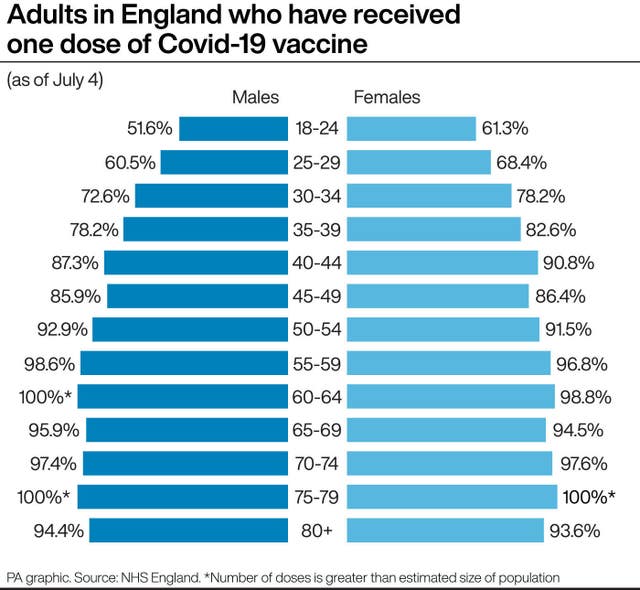
“Cases will rise as we unlock, so, as we confirm our plans today, our message will be clear.
“Caution is absolutely vital, and we must all take responsibility so we don’t undo our progress, ensuring we continue to protect our NHS.”
Dr Mike Tildesley, from the University of Warwick and a member of the Scientific Pandemic Influenza Group on Modelling (Spi-M) group, said there has been “mixed messaging” over face masks.
And he said the UK is at a “really tricky phase” of the pandemic, with rising cases but “still very low numbers of deaths and very low numbers of hospital admissions, though they are creeping up a little bit”.
He told BBC Breakfast: “I don’t expect we’ll see the same size of the wave as we saw back in January, but we might expect some kind of surge in hospital admissions as we move into August so really, really difficult…
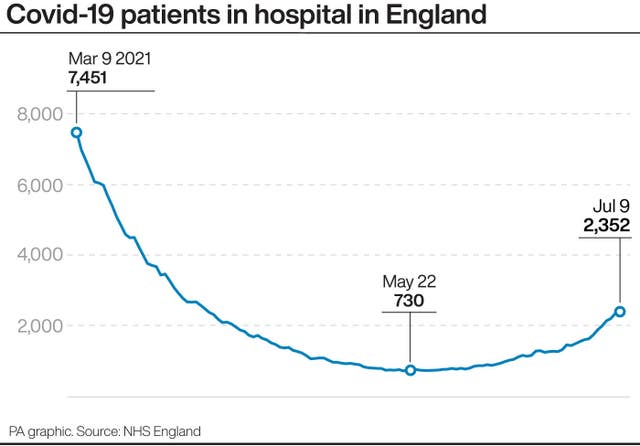
“I think we need to be a little bit cautious just for a little bit of a while yet until hopefully we see these turn over and we start to see hospital admissions ultimately going down again.”
Professor Peter Openshaw, a member of the New and Emerging Respiratory Virus Threats Advisory Group (Nervtag), said it is vital to keep some protective measures in place, such as wearing face coverings.
“I really don’t see why people are reluctant to wear face coverings – it is quite clear that they do greatly reduce transmission,” he told BBC Radio 4’s Today programme.
Prof Openshaw added that it is “more straightforward to try to get face masks used in dangerous situations if there is some kind of compulsion behind it”.
Health Secretary Sajid Javid is expected to update MPs on the plans for July 19 at the same time as Mr Johnson addresses the nation from Downing Street.
The Government has said that from Step 4 all coronavirus restrictions on gatherings will be removed, masks will no longer be legally required, social distancing measures will be scrapped and the order to work from home will be lifted.
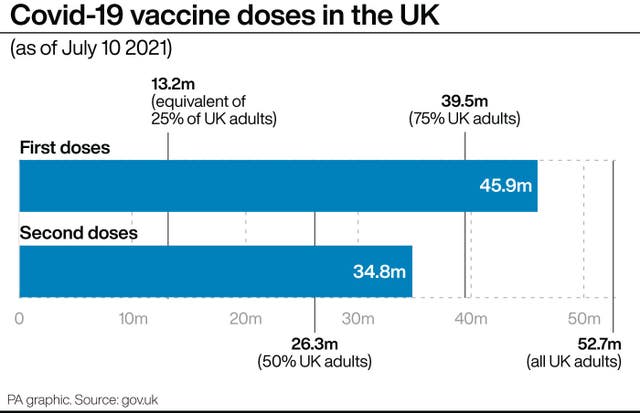
Health minister Edward Argar denied there could be confusion around the Government’s stance on mask-wearing when the legal requirement is replaced by voluntary guidance.
He told Today he is likely to continue to wear a face covering when on a train or in a lift with other people, but not necessarily when outside with few people nearby.
The Conservative MP added: “Train companies may well look at, as conditions of carriage, whether they want to impose additional guidance or additional restrictions.
“But at a governmental level, what we have set out, what we will be looking to do is see the legal requirements fall away but for guidance – strong guidance and cautious guidance – to be in place for people to exercise their common sense.”
As of 9am on Sunday, there had been a further 31,772 lab-confirmed Covid-19 cases in the UK.
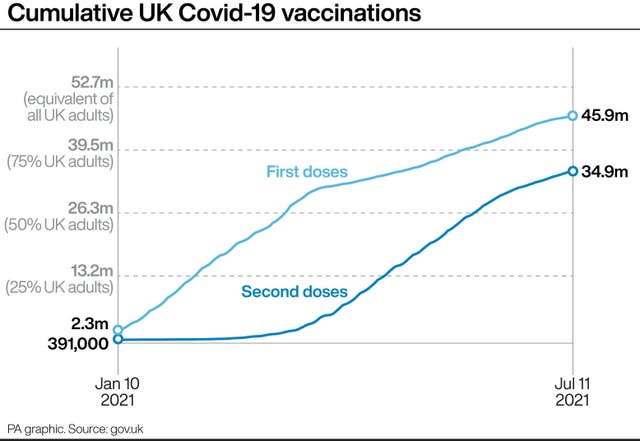
A further 26 people had died within 28 days of testing positive for Covid-19 as of Saturday, taking the UK total by that measure to 128,425.
Moving to Step 4 was delayed by four weeks to ensure all adults had been offered a vaccination.
Government data up to July 10 shows that of the 80,646,232 Covid jabs given in the UK so far, 45,881,721 were first doses, a rise of 93,763 on the previous day.
Some 34,764,511 were second doses, an increase of 211,446.
The next stage of lifting measures is seen as a further step towards normality and moving out of the pandemic.
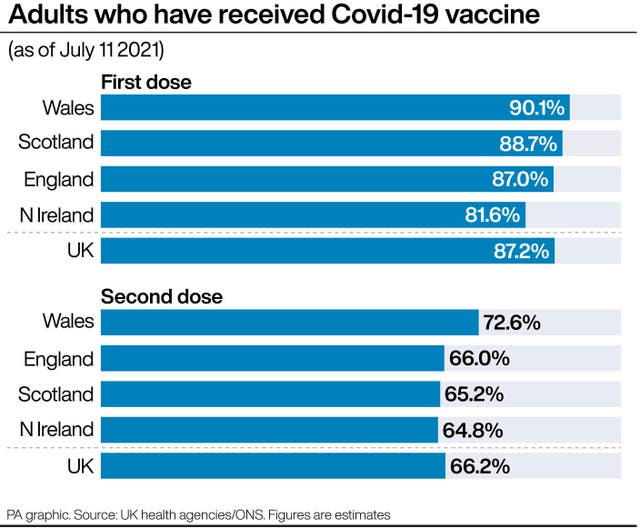
The Euro 2020 final at Wembley on Sunday was one of the Government’s test events at returning to mass gatherings, with more than 60,000 fans packing the stadium for the match against Italy which England agonisingly lost on penalties.
All those attending needed to have proof of a negative Covid-19 test or full vaccination 14 days before the fixture.
However some ticketless fans managed to breach security to get into the stadium.
A number of such events have been held during the delay to lifting measures to monitor Covid-19 infection rates.





